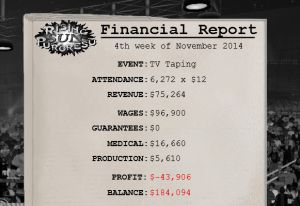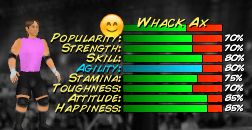
Moves |
Promoting

Cards
You can choose any date you want to stage an event by double-tapping on it and
booking up to 6 fights. Tap either side of the date line to browse through the
calendar in real time. Simply touch an empty slot to fill it or tap any existing
names to replace those. You can clear the slot by hitting the
X in the corner, or randomly generate a fight
by pressing the arrows. It's up to you
how much content you offer your fans and how often (but at least 3 fights every
2 weeks is suggested). Although a card would be booked well in advance in real
life, you are free to make last minute changes in this game. On the night of the
show, pressing PLAY will either start the
currently highlighted fight or the nearest available one. You may enjoy playing
each one, or you can set the controls to "CPU" to
WATCH them. You can instantly simulate a result from the pause
menu. Once a fight is over, the winner will be highlighted green and the loser
red.
Attendance
Depending on how popular and highly ranked the
fighters are in each spot, your card will attract an increasingly large
audience. Don't worry if you open up to 500 fans watching the preliminaries
because the arena should fill up by the end of the night! As you'd expect, the
main event is largely responsible for drawing the most people - so not putting
your best fight there is a wasted opportunity. On the other hand, the
preliminaries have less impact - so feel free to experiment with weaker talent
there. The appeal of a fight can also be magnified by having championships on
the line or settling an existing rivalry.
Finances
The more fights there are, the more you can charge
for tickets. A main event is worth $5, the co-mains are worth $3
each, and the preliminaries are an extra $1 each - adding up to a maximum
of $14. But it's important to strike the right balance, because you also
have to pay the agreed "Purse" to any talent you use. Unlike the fighting
career, they are paid whether they win or lose. Every week, your company also
has "Expenses" to keep up whether you have a show or not. This is
relative to how much you have in the bank, challenging you to become
increasingly more successful.
Ratings
It's not enough for popular stars to just "show up" because each fight on the
card also has to entertain the crowd. This comes easier to talented fighters who
the fans enjoy watching, but they still have to apply themselves. A fight is
considered to be entertaining if it contains a lot of back-and-forth action,
peppered with knock-out blows, spectacular takedowns, and clever counters. If a
fight is too one-sided or stagnant, the fans may lose interest. Having a title
on the line or an existing rivalry can add to the hype. The overall quality of
the show will influence whether your brand's popularity goes up or down - as
reflected by the TV ratings. This in turn affects how many people will come to
see your product next time. As with the attendance, there is a greater
responsibility on the main event to be entertaining whereas the preliminaries
contribute less.
Attributes
When choosing which fighters to use, you may want to consider the following
stats:
- Popularity is how well known they are (though not necessarily well
LIKED!). The more famous stars attract larger audiences and command larger fees.
Their actions are also considered to be more entertaining.
- Striking indicates how much damage they can inflict. Good strikers are
more likely to knock out opponents. Their strikes are also more entertaining to
fans.
- Grappling affects how easily they can either make transitions of their
own or thwart the efforts of an opponent. Good grapplers are also more likely to
make opponents tap out.
- Speed refers to both how quickly they move and how swiftly they strike.
Both are valuable assets in taking control of a fight, as well as entertaining
an audience.
- Stamina determines how quickly their health recovers - both during a
fight and between fights. An unfit athlete will not be able to perform at their
best week after week, as all physical stats are filtered through their current
health.
- Toughness refers to their ability to absorb punishment - such as how
many shots they can take before falling down, and how quickly they can retaliate
with an attack of their own. It also suggests how likely they are to submit,
bleed, or get injured.
Further Reading
I regret that there is more to this game than I could ever explain here, so I
hope you enjoy figuring some things out for yourself! Or you may want to join
the debate on social media where any curious questions will be answered by
myself or other players:
Copyright © MDickie 2000 - 2015




